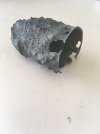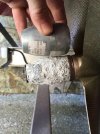You are using an out of date browser. It may not display this or other websites correctly.
You should upgrade or use an alternative browser.
You should upgrade or use an alternative browser.
cleaning anodes
- Thread starter samba123
- Start date
Corey_lax
Crew Member
I think it’s a matter of what type of wire brush you are using. Stainless brush shouldn’t react? I think you just don’t want to use a brush that will pit the anode by galvanic reaction.whats the best way to clean aluminum anodes? Have heard wire brush is a bad idea... tried sandpaper but it doesn't get into groves or some of the minor pits in the aluminum anode.
YachtMech
Well-Known Member
you dont need to clean anodes, as they sacrifice ions they corrode, the build up on the surface is the result of the breakdown of the crystal lattice that forms the metallic aluminum alloy, this is normal and does not need to be cleaned off, it will simply wash away as you expose it to water.
you only need to make sure that the surface they are mounted to and the fasteners used are clean and not painted to provide effective transfer of current.
you only need to make sure that the surface they are mounted to and the fasteners used are clean and not painted to provide effective transfer of current.
Desdemona1995
New Member
Muriatic acid is difficult to clean off and a reaction of the anode can occur. I would not recommend this. The anode, whether it's zinc or aluminum, will benefit from cleaning. The "so-called" powder that is to be removed from an anode, say by brushing, is oxide (consumed metal) and a build up of this oxide will act as a coating of the metal underneath which causes less oxygen to be in contact with the anode. Oxygen is required for a galvanic reaction to occur, so keeping the anode clean is essential. Normally, motoring a vessel is sufficient to clean anodes. Vessels that are moored for periods of time should have anodes checked and cleaned if build-up is occurring. SS brushes are preferred. Stiff plastic will be fine. Steel brushes should be avoided, as steel particulates can be left embedded in the anode and steel (iron) will passify current output on both zinc and aluminum anode.|Muriatic acid is the best...dissolves the oxidation and in all the crevices
Newf
Crew Member
Far from an expert on this matter but I agree with Yachtmech. Bigger commercial vessels have anodes that are never ever cleaned, only replaced as they get to a certain point. On a much smaller scale, the photos show my prop zinc which I never ever cleaned over a 4 year period. ( Boat is trailered and not left in the salt chuck) After removing the old one I dropped it in muriatic acid for a very short time to removed powder/scale etc. I believe the second photo shows that the anode, under all that powder and scale, was continuing to do it's jobs because it still had contact with the stub end of the prop shaft and therefore provided the necessary bonding. I could be totally wrong in that assumption. The OP doesn't describe the situation for the anode but dropping it in a muriatic acid bath for a short time and totally flushing with water should not be an issue as you can dilute any remnants to a point where the acid is non existent. Again, no expertise in this matter, just personal experience.you dont need to clean anodes, as they sacrifice ions they corrode, the build up on the surface is the result of the breakdown of the crystal lattice that forms the metallic aluminum alloy, this is normal and does not need to be cleaned off, it will simply wash away as you expose it to water.
you only need to make sure that the surface they are mounted to and the fasteners used are clean and not painted to provide effective transfer of current.


searun
Well-Known Member
oh crap, I'm screwed...in and out of freshwater marina every trip. What should I be looking for, they look fine.I was informed by an expert that aluminum anodes do not need to be cleaned and that Zink anodes should be cleaned with a wire brush any time they touch fresh water
SteelyDan
Well-Known Member
They will glaze over with calcium. As long as there deteriorating your good but what's a guy supposed to do? I do the same thing, in and out of fresh and I changed out everything to aluminum as soon as I found this out and didn't worry about it anymore.oh crap, I'm screwed...in and out of freshwater marina every trip. What should I be looking for, they look fine.
Gear'n'beer!
Well-Known Member
part of my job is maintaining a drydock that was commissioned in 1887. we change the zinc anodes on the pumps, valves and intake/discharge tunnels as they deteriorate. Seems to work. like to see impressed current on some of the systems but that seems unlikely.
searun
Well-Known Member
One thing I do every season is change out all the internal engine zincs. Easy job, only takes a few minutes to do each one, and you would not believe how badly they are worn. I run between 300 and 400 hours a season, so probably more than most people, but was surprised when I first started changing out my own internal zincs.
Similar threads
- Replies
- 17
- Views
- 915
- Replies
- 36
- Views
- 2K
- Replies
- 9
- Views
- 1K
- Replies
- 3
- Views
- 626

